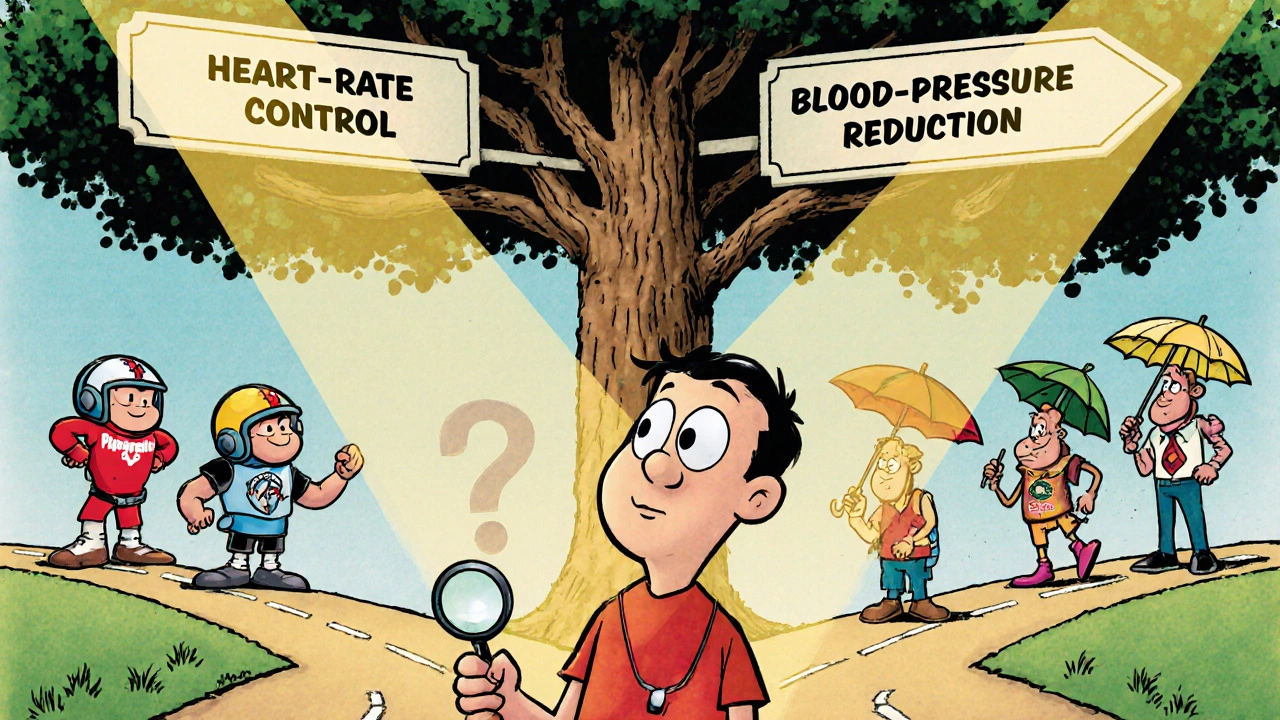Heart Medication Decision Guide Calculator
Choose your primary medical concern
Do you have respiratory conditions?
Select any additional considerations
Best Fit Options
Based on your selected criteria, these medications provide the optimal balance between effectiveness and safety for your situation.
Important Safety Note
When your doctor mentions a beta‑blocker, the name Propranolol often tops the list. But is it always the right pick? Let’s break down how it stacks up against the most common alternatives, so you can see where it shines, where it falls short, and which drug might suit your specific heart condition or anxiety needs.
What is Propranolol?
Propranolol is a non‑selective beta‑adrenergic blocker that reduces heart rate, contractility, and blood pressure by blocking both beta‑1 and beta‑2 receptors. First approved in the 1960s, it’s used for hypertension, angina, arrhythmias, migraine prophylaxis, and performance anxiety.
How Do Other Beta‑Blockers Differ?
Not all beta‑blockers are created equal. Some target only beta‑1 receptors, sparing the lungs and making them safer for asthmatics. Others add vasodilatory properties that help lower blood pressure more gently.
- Metoprolol - cardio‑selective (beta‑1) blocker, often chosen for heart‑failure patients.
- Atenolol - another beta‑1 selective agent, known for once‑daily dosing.
- Carvedilol - mixed beta‑blocker/alpha‑1 blocker that also relaxes blood vessels.
When Do Doctors Reach for Non‑Beta‑Blocker Options?
Sometimes the therapeutic goal isn’t just heart‑rate control. For pure blood‑pressure reduction, doctors may opt for ACE inhibitors, calcium‑channel blockers, or diuretics. Here’s a quick snapshot of the most common alternatives:
- Lisinopril - an ACE inhibitor that blocks the conversion of angiotensin I to II, lowering vascular resistance.
- Amlodipine - a calcium‑channel blocker that dilates peripheral arteries.
- Hydrochlorothiazide - a thiazide diuretic that reduces fluid volume.

Side‑Effect Profile: What to Expect
Side effects are often the deciding factor. Below is a side‑by‑side look at the most frequently reported adverse events for each class.
| Drug | Common Side Effects | Serious Risks |
|---|---|---|
| Propranolol | Fatigue, cold extremities, vivid dreams | Bronchospasm in asthmatics, severe bradycardia |
| Metoprolol | Dry mouth, insomnia, dizziness | Worsening heart‑failure if dosage too high |
| Atenolol | Weakness, sleep disturbances | Exacerbated COPD symptoms (less than non‑selective) |
| Carvedilol | Orthostatic hypotension, weight gain | Acute decompensated heart failure if started abruptly |
| Lisinopril | Dry cough, headache | Angioedema, hyperkalemia |
| Amlodipine | Swelling of ankles, flushing | Rare myocardial infarction in high‑risk patients |
| Hydrochlorothiazide | Increased urination, electrolyte imbalance | Gout flare, severe hyponatremia |
Choosing the Right Drug: Decision Guide
Here’s a quick decision tree you can run through with your clinician:
- Is the primary goal heart‑rate control (e.g., atrial fibrillation, anxiety)?
- Yes → Consider a beta‑blocker. If you have asthma or COPD, pick a cardio‑selective agent like Metoprolol or Atenolol.
- No → Move to step 2.
- Do you need robust blood‑pressure reduction without affecting heart rate?
- Yes → ACE inhibitor (Lisinopril) or calcium‑channel blocker (Amlodipine) may be better.
- No → See if fluid overload is a factor; a diuretic such as Hydrochlorothiazide could help.
- Is there a history of migraine or essential tremor?
- Yes → Propranolol remains one of the most evidence‑backed options.

Cost and Accessibility in 2025
Generic versions of Propranolol, Metoprolol, and Atenolol still dominate the UK market, often costing under £2 for a month’s supply. Newer agents like Carvedilol and Nebivolol are slightly pricier, ranging £5‑£8 per month. ACE inhibitors and calcium‑channel blockers sit in the £3‑£6 range, depending on brand and dosage.
Key Takeaways
- Propranolol is a versatile, non‑selective beta‑blocker useful for heart conditions, migraines, and performance anxiety.
- Cardio‑selective beta‑blockers (Metoprolol, Atenolol) are safer for patients with respiratory issues.
- Carvedilol adds vasodilation, making it a solid choice for heart‑failure management.
- When the goal is pure blood‑pressure control, ACE inhibitors, calcium‑channel blockers, or diuretics often outperform beta‑blockers.
- Price differences in 2025 are modest; generic propranolol remains the most affordable option for many indications.
Frequently Asked Questions
Can I switch from Propranolol to a cardio‑selective beta‑blocker?
Yes, but you should taper the dose gradually under medical supervision to avoid rebound tachycardia or hypertension.
Why do some patients experience vivid dreams on Propranolol?
Beta‑blockers cross the blood‑brain barrier and can affect REM sleep, leading to more intense dreams. The effect usually subsides after a few weeks.
Is Propranolol still recommended for anxiety in 2025?
Yes, especially for situational anxiety like public speaking. Recent meta‑analyses confirm its efficacy comparable to newer anxiolytics but with fewer dependence concerns.
What should I avoid while taking Propranolol?
Avoid abrupt discontinuation, high‑dose alcohol, and other medications that also lower heart rate (e.g., digoxin, certain calcium‑channel blockers) without doctor approval.
How does Carvedilol differ from Propranolol in heart‑failure patients?
Carvedilol’s added alpha‑1 blockade reduces peripheral resistance, which improves cardiac output and survival rates in chronic heart‑failure, a benefit Propranolol lacks.

Rebecca Mitchell
October 17, 2025 AT 12:38Propranolol can still be the go‑to for migraines despite newer options.
Cindy Thomas
October 23, 2025 AT 07:32While the article praises propranolol’s versatility, it ignores the fact that cardio‑selective blockers often have a cleaner side‑effect profile. For patients with COPD, metoprolol or atenolol is generally a safer bet 😉. The cost argument also overstates the savings since generic dosages are similar across the board.
Kate Marr
October 29, 2025 AT 01:25When you look at the data, it’s clear the US market pushes cheap propranolol because of domestic manufacturing 👏. That doesn’t mean it’s medically superior, just economically convenient. Other nations prefer newer agents with better lung safety profiles.
James Falcone
November 3, 2025 AT 20:18Honestly, the biggest win for propranolol is its track record – it’s been around for decades and doctors trust it. Newer drugs can’t match that legacy, especially when insurance formularies still favor the old‑school meds.
Frank Diaz
November 9, 2025 AT 15:12One must ask why we cling to propranolol when the pharmacodynamics are dated. The allure of tradition blinds us to the nuanced benefits of cardio‑selective agents. In the realm of hypertension, metoprolol offers comparable efficacy with fewer respiratory risks. Yet the medical establishment clings to the familiar, branding propranolol as a catch‑all. This bias perpetuates suboptimal prescribing. The patient’s experience, especially those with asthma, suffers under this inertia. A rational approach would prioritize individual receptor profiles over historical comfort.
Kevin Adams
November 15, 2025 AT 10:05Behold! The saga of propranolol versus its modern rivals is a drama worthy of the silver screen!!!
In Act I, propranolol strides onto the stage, a veteran hero, quelling tremors and angina with bravado.
Act II introduces metoprolol, the sleek understudy, whispering promises of lung‑friendliness.
Act III unveils carvedilol, the wildcard, blending alpha‑blockade for a spectacular climax.
Yet the plot twist? The cost of generics renders the ancient champion still affordable.
Audience members gasp as side‑effects surface-cold hands, vivid dreams-the shadows of a complex antagonist.
The director’s cut reveals that for migraine sufferers, propranolol remains a star, shining bright.
Meanwhile, the chorus of clinicians debates the perfect casting for each patient.
In the final scene, the curtain falls not on a single drug, but on the wisdom of personalized medicine.
Thus, the tale ends, leaving us to write our own epilogues.
RJ Samuel
November 21, 2025 AT 04:58Honestly, the whole beta‑blocker showdown feels a bit overhyped. If you’re not wrestling asthma, the cardio‑selective crowd is just a marketing buzzword. I’d pick metoprolol for heart‑failure because its evidence base is solid, not because propranolol is the nostalgic darling.
Miriam Rahel
November 26, 2025 AT 23:52From a pharmacoeconomic perspective, the marginal cost differential between propranolol and its generics is negligible, rendering the cited price advantage moot.
Mary Davies
December 2, 2025 AT 18:45When I dive into the labyrinth of beta‑blockers, I’m struck by how propranolol’s non‑selectivity can be both a blessing and a curse. It blankets the heart, lungs, and even the mind, granting relief for anxiety and tremor, yet it also drags down those with delicate respiratory systems. The article’s table is a helpful map, but the real journey is navigating patient‑specific terrain. Imagine a young athlete with occasional palpitations; the chance of cold extremities might be a deal‑breaker. Conversely, an older adult battling migraines may welcome the vivid‑dream side‑effect as a small price for fewer attacks. The decision matrix thus becomes a personal odyssey rather than a one‑size‑fits‑all prescription.
Valerie Vanderghote
December 8, 2025 AT 13:38Okay, let me just unpack this whole propranolol versus alternatives thing because there are so many layers that people seem to gloss over and it really bothers me when an article skims the surface without digging into the gritty details that actually matter to patients and clinicians alike, first off the history of propranolol is fascinating-it was one of the pioneering beta‑blockers that opened the floodgates for cardiovascular therapeutics and that legacy carries weight in prescribing habits, but legacy alone doesn’t justify its continued dominance especially when we have cardio‑selective agents that spare the lungs which is a huge consideration for anyone with asthma or COPD, second the side‑effect profile listed in the table is accurate yet it doesn’t convey the real‑world impact of fatigue and cold hands on someone’s daily functioning, I’ve seen people quit their jobs because they couldn’t tolerate the sensation of numb fingertips, third the cost argument is a bit stale because generic versions of metoprolol and atenolol are just as cheap now, so the savings argument loses its punch, fourth the anxiety and migraine indications are still valid but newer agents like escitalopram for anxiety or CGRP antagonists for migraines are emerging with better tolerance, fifth the dosing frequency matters-propranolol often requires multiple doses a day while atenolol can be once daily which improves adherence, sixth the pharmacokinetics vary with food and liver function, meaning some patients need careful monitoring, seventh the drug interactions-propranolol can amplify the effects of other negative chronotropes like digoxin, making polypharmacy a minefield, eighth the patient preference angle-some people actually like the “old school” feel of propranolol, feeling like they’re taking something proven, ninth the clinician’s comfort level-many doctors are trained on propranolol during residency and stick with what they know, which can be a double‑edged sword, tenth the guidelines-recent ESC guidelines do mention cardio‑selective agents as first‑line for certain conditions, which subtly shifts the paradigm, eleventh the real takeaway is that prescribing should be individualized, not based on a blanket hierarchy, and twelfth I hope future articles will dive deeper into these nuances instead of presenting a shallow comparison chart, because patients deserve more than a quick glance at a table, the heart of the matter is patient‑centered care.
Michael Dalrymple
December 14, 2025 AT 08:32When guiding a patient through medication choices, it helps to frame the discussion as a collaborative exploration. Consider the therapeutic goal, comorbidities, and lifestyle factors. Propranolol offers broad utility, yet cardio‑selective alternatives may align better with pulmonary health. Encourage shared decision‑making, and monitor response closely.
Emily Rankin
December 20, 2025 AT 03:25Imagine your heart as a symphony, each beat a note that must stay in harmony. Propranolol can be the steady conductor, but sometimes a different maestro like metoprolol brings a softer touch for those with breathing challenges. Embrace the possibility that the right drug may change over time, and stay hopeful that personalized care will find the perfect melody for you.
Malia Rivera
December 25, 2025 AT 22:18Propranolol’s legacy is impressive, but innovation should trump tradition.
lisa howard
December 31, 2025 AT 17:12Picture the pharmacy aisle as a stage where propranolol takes the spotlight, its name in bold lights, while metoprolol and carvedilol linger in the shadows waiting for their cue. The audience-patients-deserve a plot twist that prioritizes safety over fame. If you inhale and feel a pinch, the non‑selective hero becomes a villain, and the cardio‑selective understudy steps in gracefully. Yet the script often‑times doesn’t rewrite itself, leaving the same actor on repeat. It’s time to rewrite the narrative, to let the lesser‑known drugs have their moment, to reduce the drama of side‑effects, and to let clinicians direct the show based on evidence, not habit.
Alexis Howard
January 6, 2026 AT 12:05Most people hype propranolol but cardio selective blockers often work better for lung issues